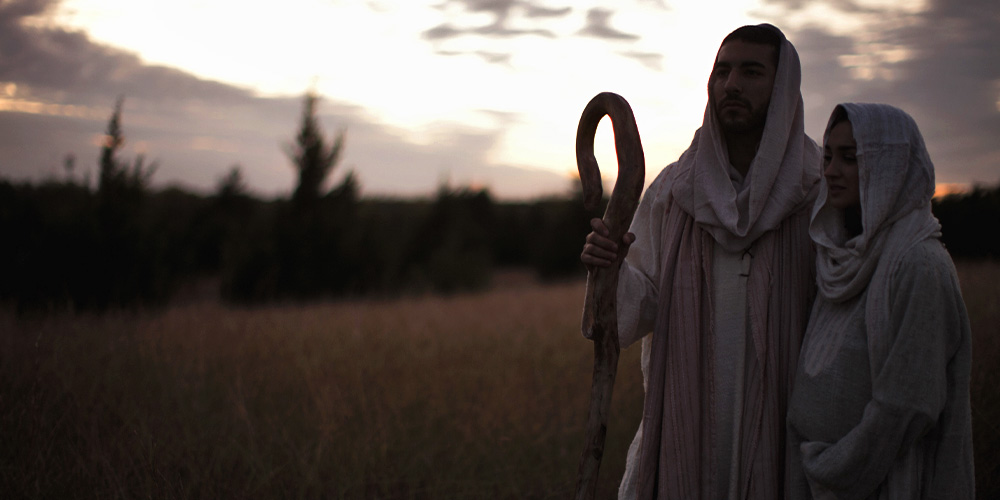 |
Were Joseph and Mary engaged or married when Joseph learned of Mary’s pregnancy?
Your question illustrates the need to bridge the culture gap of marriage customs and laws that existed in biblical days.
A marriage established by commitment
In our society today, we are familiar with relationships that progress from friendship to dating to engagement to marriage. Because we are used to this sequence of events, we might think that people in biblical times followed the same pattern. That was not the case.
“Betrothal,” as the term appears in some Bible translations, was not the engagement of our day and age. Betrothal in biblical days was the time when the bride and groom, or their representatives, signed papers to commit themselves to each other and to establish the beginning of their marriage. From that point on, the man and woman were legally married, but they did not have the right to live together as husband and wife or have sexual relations with one another. They lived separately for a time until the wedding celebration took place. Then, the man and woman lived together as husband and wife. Jesus’ parable of the ten virgins (Matthew 25:1-13) illustrates the interval of time between the beginning of a marriage and the wedding celebration.
When Joseph learned that Mary was pregnant (Matthew 1:18,19), the couple was between the time when they had established their marriage and before any wedding celebration was going to take place. They were legally married. Only death or divorce (Deuteronomy 22:22-29) could break the bond they had established, and divorce was on Joseph’s mind.
A marriage rooted in love
Joseph is the forgotten man in the account of Jesus’ birth. In the Bible, Mary receives appropriate attention as the one whom God graciously chose to be the one to give birth to the Son of God (Luke 1:30-33). But what about Joseph?
We first come across Joseph in the family tree of Jesus’ human ancestry found in Matthew 1:16. We learn that Joseph came from royal lineage, but we know little else about him. We are aware of what Joseph was thinking when he realized Mary was pregnant: “Because Joseph her husband was faithful to the law, and yet did not want to expose her to public disgrace, he had in mind to divorce her quietly” (Matthew 1:19).
Mary’s miraculous conception by the Holy Spirit put Joseph in a challenging situation. Without knowing about the Holy Spirit’s work in Mary, Joseph could only conclude that Mary had been unfaithful to him. If Joseph had wanted to press the issue, the results could have been disastrous for Mary and the unborn child in her womb, the Messiah (Deuteronomy 22:23,24). Love for God and love for Mary led Joseph to pursue a different course of action—a divorce that was intended to shelter Mary from public shame.
God thwarted that plan by directing an angel to inform Joseph in a dream that Mary’s pregnancy was the result of the Holy Spirit’s work. We see Joseph’s love for God in his next waking moments: “When Joseph woke up, he did what the angel of the Lord had commanded him and took Mary home as his wife” (Matthew 1:24). The last words of that verse demonstrate that Joseph and Mary were legally married at this time.
Joseph was a man who displayed the kind of love that reflected the love of his foster son and Savior: “Husbands, love your wives, just as Christ loved the church and gave himself up for her” (Ephesians 5:25). Joseph and Mary’s marriage was established by commitment and rooted in love.
Submit your questions to forwardinchrist.net/submit.
Author: James F. Pope
Volume 105, Number 12
Issue: December 2018
- Q&A: What would Jesus think about all the different Christian denominations?
- Q&A: Are there times when it is okay to lie?
- Q&A: What advice does the Bible have for single people?
- Q&A: How do I know I am elected by God?
- Q&A: Why is Pontius Pilate immortalized in our creeds?
- Q&A: How does remembering my baptism help with the guilt I carry?
- Q&A: Do parts of the Bible teach works righteousness?
- Q&A: How can I overcome my struggle with lust and pornography?
- Q&A: How should I help my child struggling with same-sex attraction?
- Q&A: Should Christians pray to saints?
- Q&A: Is anger sinful?
- Q&A: How can parents encourage adult children who wander from the faith?
- Q&A: Does the doxology belong in the Lord’s Prayer?
- Q&A: Is God fair?
- Q&A: When we pray, “Your kingdom come,” what are we praying for?
- Q&A: How can I better manage what God has given me this year so that I glorify him?
- Q&A: What are ways to glorify God besides singing in church?
- Q&A: I have no special gifts, and I mess up all the time. Does God really need me?
- Q&A: How do I overcome the feeling that my life has no purpose and I don’t make a difference?
- Q&A: My friend died and was not a professing Christian. What do I say to the family?
- Q&A: How can my mother and I forgive my father for being unfaithful and causing my parents to divorce?
- Q&A: Why were demon possession, gifts of healing, and gifts of tongues more prevalent in biblical times?
- Q&A: Is Christianity the only religion that gives the certainty of heaven?
- Q&A: If people go to hell, isn’t it their fault because God gave them free will and they rejected him?
- Q&A: Why are the 40 days between Jesus’ resurrection and his ascension important for the disciples and for us?
- Q&A: Can you explain Jesus’ words to the wailing women he met on his way to be crucified?
- Q&A: What if spouses don’t “love” each other anymore?
- Q&A: Is it wrong to have a cross with Jesus’ body on it?
- Q&A: Is our time of grace really unchangeable?
- Q&A: I know that we are saved by grace apart from works, but how can it be that easy?
- Q&A: Are there degrees of glory in heaven as a reward for good works?
- Q&A: Do Lutherans take the Bible literally and teach millennialism?
- Q&A: Are there different interpretations of the Bible?
- Q&A: How can we be sure the Bible includes what God originally gave us?
- Q&A: Why does it seem like Christianity is so negative?
- Q&A: How can I explain how Jesus’ resurrection is possible and if the Bible is reliable?
- Q&A: Is it okay to live together if we are planning to get married?
- Q&A: How is the Bible God’s Word?
- Q&A: Were we “created to make a difference”?
- Q&A: Am I being judgmental if I point out someone’s sin?
- Q&A: Do I need to read the Bible to have a relationship with God?
- Q&A: Can a Christian vote for a political candidate who supports abortion?
- Q&A: Does God really care?
- Q&A: Does it really matter how God made the world?
- Q&A: Does God send people to hell?
- Q&A: Is death natural?
- Q&A: How can I forgive and forget?
- Q&A: Does God help those who help themselves?
- Q&A: How can we say that the Old Testament God is the same as the New Testament God?
- Q&A: Is Jesus the only way to get to heaven?
- Q&A: Doesn’t God want me to be happy?
- Light for our path: Does God hate us?
- Light for our path: What kind of comfort can you give someone when a loved one commits suicide?
- Light for our path: What does a submissive wife in a Christian marriage look like?
- Light for our path: Is it a sin to want to die from a terminal illness?
- Light for our path: What advice can you give about applauding in church?
- Light for our path: Can you please explain Matthew 5:20?
- Light for our path: What is karma?
- Light for our path: Can the devil personally be tempting me and a lot of other people at exactly the same time?
- Light for our path: Does the word Easter refer to Ishtar, the Babylonian fertility goddess?
- Light for our path: What role does emotion play in contrition?
- Light for our path: What does the white stone in Revelation 2:17 mean?
- Light for our path: Is the cross symbol now anti-Christian?
- Light for our path: Were Joseph and Mary engaged or married when Joseph learned of Mary’s pregnancy?






